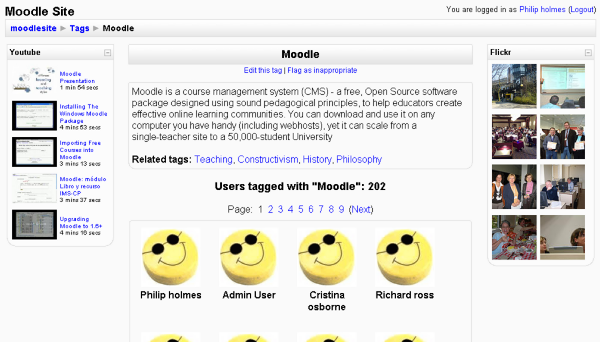Tags: Difference between revisions
From MoodleDocs
Helen Foster (talk | contribs) (enabling tag functionality, tag creation) |
Helen Foster (talk | contribs) (nav template change, category) |
||
| (27 intermediate revisions by 12 users not shown) | |||
| Line 1: | Line 1: | ||
{{ | {{More features}} | ||
Tags allows students and teachers to describe their interests in a way that is easy for people with similar interests to find them. The user's profile has a place to enter interests, which will create or add the user to an existing tag. Tag pages can be viewed and blog posts can be tagged. | |||
* [[Tag settings]] | |||
* [[Using tags]] | |||
* [[Managing tags]] | |||
[[Image:moodle_tag_page.png]] | |||
== | ==See also== | ||
* [[Tags FAQ]] | |||
*[http://www.youtube.com/watch?v=YwNuC3XkCQo Video tutorial explaining tags and how to add them in Moodle] | |||
[[Category:Tags]] | |||
[[eu:Etiketak]] | |||
[[fr:Tags]] | |||
[[de:Schlagworte]] | |||
[[ja:タグ]] | |||
Latest revision as of 06:52, 19 October 2011
Tags allows students and teachers to describe their interests in a way that is easy for people with similar interests to find them. The user's profile has a place to enter interests, which will create or add the user to an existing tag. Tag pages can be viewed and blog posts can be tagged.
